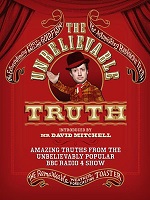Being asked to think of a team-building exercise to run with my new personal tutees in Welcome Week got me thinking about the best way to do this. So, naturally, my thoughts turned to screencasts! I have come up with an idea which I think should work…
I am going to produce a series of screencasts about topics relevant to our new students (in my case, English Literature, being a student, living in Reading…that sort of thing…) and each of these will contain one or two lies. (For any of you who listen to ‘The Unbelievable Truth’ on Radio 4 or who watch ‘Would I Lie to You?’ on TV, this will be starting to sound familiar…).

I am hoping to join up with a few colleagues for this, so that we have some decent-sized groups of tutees. The new students will watch the screencasts and then will work as a group to identify the lies. I am hoping that five screencasts will suffice for an hour of activity.
I will be giving out a prize to the winning team and I hope they will also have had fun and got to know their new university peers.

What I am not sure about yet is whether to divide them into their personal tutor groups, so that each set of personal tutees can bond as a group. I also can’t quite decide whether to lodge the screencasts on our YouTube channel so that they (and the world) can look at them in advance. I think the element of surprise is probably best, but I am going to give it some more thought.
One of the pleasures of a group project like GRASS is the way that we can help each other and share ideas. When I took this plan to Emma she immediately decided that she could do something similar, but rather than using screencasts based on Prezis or animation, she is going to ask her colleagues to film themselves reciting a script which contains some lies.

This would have a huge advantage in that the students would see some of their lecturers on film before they meet them in person, so I think it is an improvement. I was planning to ask the personal tutors to recite from a screen showing the screencasts, which has the benefit of letting me ‘volunteer’ colleagues at the last minute, but does not leave a lasting record of their speech.
Hhmmmmm…it seems that whenever we find one way to do something, another way pops up….
As with all of our projects, you will need to keep watching the blog to see what worked best on the day…




